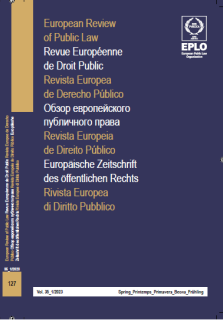
Artificial Intelligence as an Opportunity
to Tackle Climate Change: A Legal Perspective
Postdoctoral Researcher in Public Law, Department of Public Law, University Pablo de Olavide, of Seville, cacia@upo.es.
The aim of this paper is to develop and share some suggestions about the role of Artificial Intelligence in challenging climate change. Particularly, Artificial Intelligence systems could play a crucial role implementing the European Green Deal, as well as helping to counteract the already widely noticeable negative effects of climate change. However, the massive utilisation of Artificial Intelligence tools highlights several theoretical, factual, and ethical issues to public decision-makers and academic scholars, as well as important challenges for the realisation of a fair and sustainable future.
L’objectif de ce document est de développer et de partager quelques suggestions sur le rôle de l’intelligence artificielle dans la lutte contre le changement climatique. En particulier, les systèmes d’intelligence artificielle pourraient jouer un rôle crucial dans la mise en œuvre du Green Deal européen et contribuer à contrecarrer les effets négatifs déjà largement perceptibles du changement climatique. Cependant, l’utilisation massive d’outils d’intelligence artificielle soulève des questions théoriques, factuelles et éthiques pour les décideurs publics et les universitaires, ainsi que des défis importants pour la réalisation d’un avenir équitable et durable.
* I would like to thank for their funding support the University Pablo de Olavide, of Seville, and the Spanish Ministry of Universities under the research programme “María Zambrano”, funded by the Next Generation-EU. Paper developed within the research project UPO-1381574, “Artificial Intelligence and Administrative Law: general problems and applications in the Public Administration of Andalusia”, granted by Resolution of February 4, 2020, concerning aid in competitive award for projects I+D+i under the Operational Programme FEDER Andalusia 2014-2020.
** I would like to thank Dr. Elisabet Ruiz Cairó for her advice in drafting the paper.





















